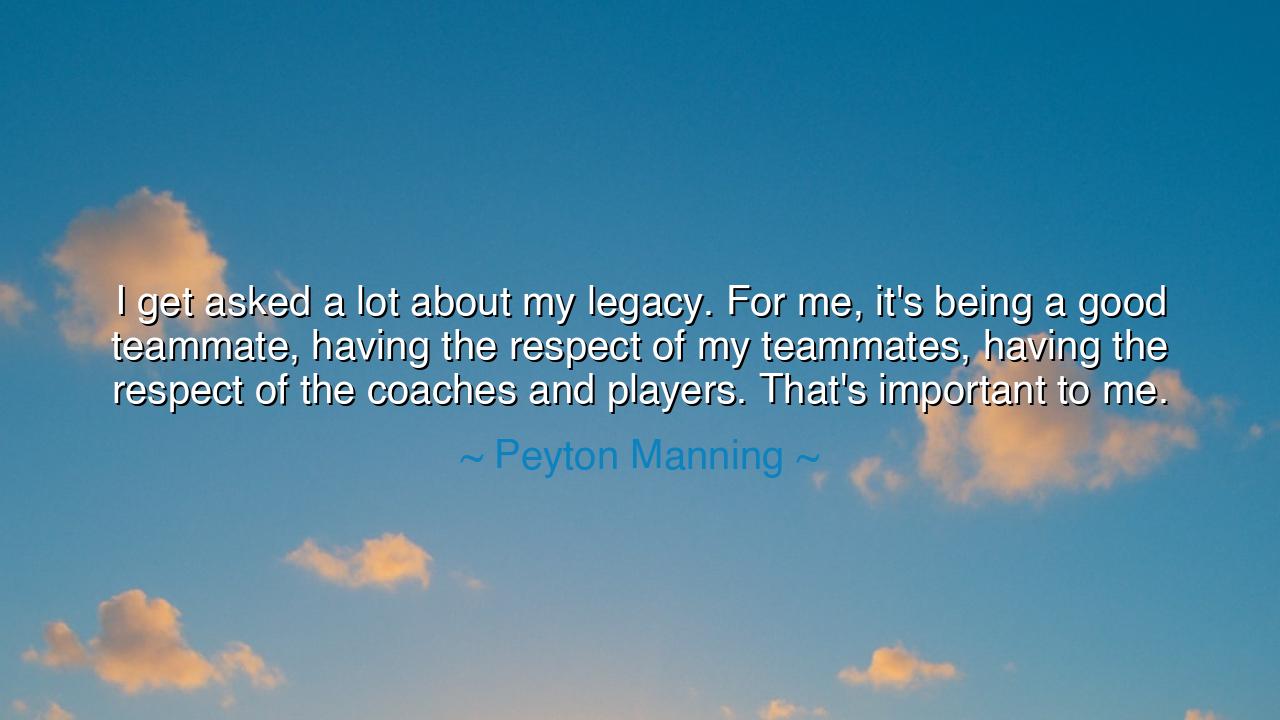
I get asked a lot about my legacy. For me, it's being a good
I get asked a lot about my legacy. For me, it's being a good teammate, having the respect of my teammates, having the respect of the coaches and players. That's important to me.






In the words of Peyton Manning, one of the great generals of the gridiron, there shines a truth that reaches far beyond the realm of sport: “I get asked a lot about my legacy. For me, it's being a good teammate, having the respect of my teammates, having the respect of the coaches and players. That's important to me.” These words, humble yet profound, remind us that true greatness is not carved in trophies or measured in statistics, but in the hearts of those who stand beside us. Manning speaks not as a conqueror basking in his victories, but as a servant-leader who understands that no man, no matter how gifted, stands alone.
In an age where fame burns brighter than character, Manning’s words are a call back to the ancient virtues — humility, loyalty, and respect. To him, the measure of a life is not how loudly the crowd cheers, but how deeply one’s companions trust and admire him. This is the heart of teamwork — a bond born not of convenience but of shared struggle, of sacrifice for something greater than oneself. It is the same spirit that guided warriors in the phalanx, sailors upon storm-tossed seas, and soldiers who stood shoulder to shoulder upon the field of battle. The lesson Manning teaches is this: legacy is not what others remember of you; it is what you build with others.
From the earliest days of his career, Peyton Manning was known not only for his arm, but for his mind — a master strategist, relentless in preparation, always elevating those around him. Teammates spoke of his leadership, not through command, but through example. He studied not for glory, but for duty; not for acclaim, but for respect. When asked about legacy, he did not speak of championships, records, or fame. He spoke of respect — a treasure that cannot be bought, but only earned through years of consistency, integrity, and honor. For in the world of fleeting applause, respect endures like a mountain — silent, steadfast, eternal.
There is a story told of a time late in Manning’s career, when injuries had slowed his once-mighty arm. Yet even then, he led with the same fire, guiding his team with wisdom instead of force. In the locker room, younger players looked to him not as a legend, but as a brother — one who had walked every mile with them, shared every defeat, and rejoiced in every small victory. When at last he lifted the Lombardi Trophy for the final time, it was not his skill alone that brought him there, but the faith of those who followed him. His legacy, as he said, was not in the prize, but in the bond.
History, too, bears witness to this truth. Think of Marcus Aurelius, emperor of Rome and philosopher of the soul, who once wrote, “Waste no more time arguing what a good man should be. Be one.” Like Manning, he understood that greatness is not declared, but demonstrated — that the leader’s task is not to dominate, but to inspire. When Aurelius marched with his soldiers through cold and hardship, he shared their bread and their burden. His men loved him not because he ruled, but because he respected them. Thus, his legacy endures not in monuments, but in memory — the same legacy Manning seeks in the hearts of his teammates.
This truth transcends the playing field and belongs to all who walk the path of work and fellowship. Whether one is a leader in business, a teacher among students, or a parent among children, the essence is the same: respect is the seed from which all greatness grows. To earn it, one must listen more than speak, serve more than command, and give more than one takes. The world will always honor brilliance for a moment, but it will revere character forever.
So, my children, take heed of Peyton Manning’s wisdom. Do not chase legacy — build it. Do not hunger for fame, but for respect; not for titles, but for trust. In every team, every family, every community, strive to be the one others can rely upon — steady in chaos, humble in triumph, gracious in defeat. For when your days are done, and the noise of the crowd has faded, your true legacy will not be the records written in books, but the hearts you have lifted, the lives you have strengthened, and the respect you have earned through the quiet, steadfast power of being a good teammate.
And remember this eternal truth: the mightiest heroes are not those who stand above their comrades, but those who stand beside them. Such is the legacy of Peyton Manning — and such should be the legacy of all who seek to live with honor, humility, and heart.






AAdministratorAdministrator
Welcome, honored guests. Please leave a comment, we will respond soon